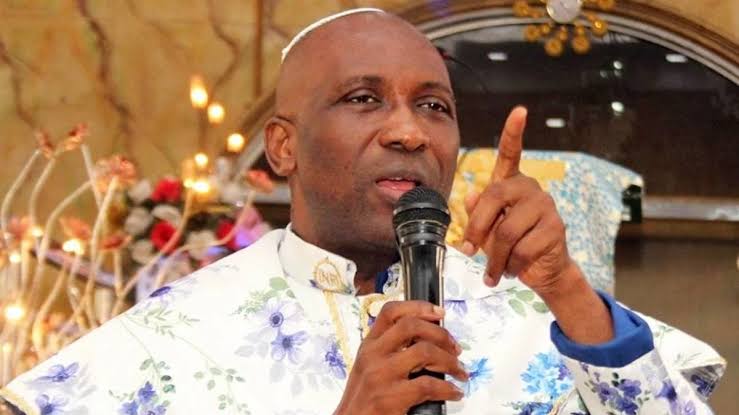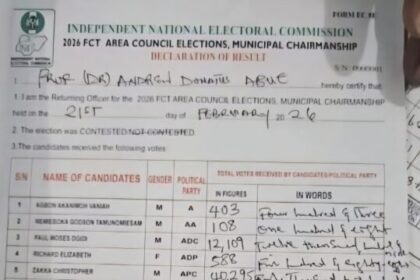– The Intersection of Religion and Politics in Nigeria
In Nigeria, where religion and politics are deeply intertwined, statements from influential religious leaders can significantly shape public opinion and electoral outcomes.
Recently, Primate Elijah Ayodele, a prominent Nigerian clergyman and leader of the INRI Evangelical Spiritual Church, stirred controversy by declaring that President Bola Tinubu is the right candidate to vote for in the 2027 elections, warning that voting for Peter Obi or Atiku Abubakar would lead to national tragedy or collapse.
This bold statement, made under the banner of divine prophecy, has sparked debates about the role of religious influence in Nigerian politics, the ethics of using spiritual authority to endorse political candidates, and the potential for such statements to incite division. …CONTINUE READING


Let’s delve into Primate Ayodele’s remarks, their implications, and the broader consequences of blending religious and political rhetoric in a polarized nation.
Primate Ayodele’s Statement: Context and Content
Primate Ayodele, known for his annual prophecies and political predictions, recently made headlines with a statement attributed to him by the All Progressives Congress (APC). According to posts found on X, Ayodele claimed:
“If Nigerians vote for Peter Obi, tragedy will strike this nation. If they vote for Atiku Abubakar, Nigeria will collapse. As surprising as it may seem, Tinubu, the same Tinubu, is the one to vote for. That is the truth.”
Additionally, he advised Peter Obi not to contest against Tinubu in 2027 without forming a coalition, describing Tinubu as “too powerful” to be defeated single-handedly.
These remarks come at a time when Nigeria is grappling with economic challenges, political polarization, and heightened anticipation for the 2027 general elections. Tinubu, the incumbent president and APC leader, faces criticism over issues like inflation and insecurity, while Peter Obi, the Labour Party’s 2023 presidential candidate, enjoys strong support among younger voters and the “Obidient” movement. Ayodele’s endorsement of Tinubu, framed as a divine revelation, raises questions about the motives behind his statement and its potential impact on Nigeria’s fragile political landscape.
The Power of Religious Influence in Nigerian Politics
Nigeria is one of the most religious countries in the world, with Christianity and Islam shaping the lives of millions. Religious leaders like Primate Ayodele wield significant influence, often acting as moral compasses for their followers. When such leaders make political pronouncements, their words carry weight, especially among devout congregants who view them as God’s representatives.
Ayodele’s statement leverages this religious influence to sway public opinion. By framing his endorsement of Tinubu as a divine mandate, he taps into the spiritual trust of his followers, potentially influencing their voting decisions. However, this approach is not without risks. Nigeria’s history is replete with examples of religious rhetoric fueling division, and Ayodele’s warning of “tragedy” or “collapse” if Obi or Atiku is elected could be interpreted as inflammatory, especially in a country with a history of election-related violence.
Implications of Ayodele’s Statement
Risk of Polarization and Incitement
Ayodele’s statement, particularly the dire warnings about Peter Obi and Atiku Abubakar, could deepen Nigeria’s already polarized political climate. By suggesting that voting for Obi would lead to “tragedy,” Ayodele risks alienating Obi’s supporters, who are largely young, urban, and passionate about change. Such rhetoric could be perceived as an attempt to demonize opposition candidates, potentially inciting hostility among voters with differing political affiliations. In a country where ethnic and regional divisions often overlap with political loyalties—Tinubu is Yoruba from the Southwest, Obi is Igbo from the Southeast, and Atiku is Fulani from the Northeast—Ayodele’s statement could exacerbate tensions. The use of apocalyptic language like “tragedy” and “collapse” is particularly concerning, as it could be exploited by political actors to stoke fear and division.
Erosion of Democratic Choice
By presenting his endorsement as a divine directive, Ayodele may undermine the democratic principle of free choice. Voters should make decisions based on candidates’ policies, track records, and visions, not on spiritual pronouncements. When a religious leader claims divine insight into electoral outcomes, it risks creating a sense of fatalism, where voters feel their choices are predetermined by a higher power rather than their own agency. This is particularly problematic in the case of Peter Obi, whose 2023 campaign galvanized millions of young Nigerians disillusioned with the status quo. Ayodele’s dismissal of Obi’s candidacy could discourage political engagement among these voters, who see Obi as a symbol of hope for systemic change.
Questions of Bias and Motive
Ayodele’s alignment with Tinubu, a sitting president and APC leader, raises questions about his impartiality. Critics may argue that his statement serves the interests of the ruling party rather than the public. The fact that his remarks were amplified by APC-affiliated sources suggests a possible political agenda, whether intentional or not. Religious leaders are expected to remain neutral or focus on advocating for good governance rather than endorsing specific candidates. Ayodele’s explicit support for Tinubu could erode trust in his spiritual leadership, with some questioning whether his prophecies are driven by divine revelation or political affiliations.
Impact on Religious Institutions
The blending of religious and political rhetoric risks tarnishing the credibility of religious institutions. If Ayodele’s predictions prove inaccurate or his endorsements are perceived as partisan, it could lead to skepticism about the role of prophecy in public life. This is particularly significant in Nigeria, where religious leaders are often seen as arbiters of truth in a society grappling with distrust in institutions.
The Ethics of Religious Leaders in Politics
The controversy surrounding Ayodele’s statement highlights broader ethical questions about the role of religious leaders in Nigerian politics. While freedom of speech allows clerics to express political opinions, using their spiritual authority to influence elections raises concerns about accountability and responsibility.
Religious leaders must balance their right to speak with the potential consequences of their words. In a diverse and sensitive nation like Nigeria, statements that appear to favor one candidate or demonize another can have far-reaching effects. Ayodele’s warning about Peter Obi and Atiku, for instance, could be interpreted as an attempt to manipulate voters through fear, a tactic that undermines the democratic process.
Moreover, religious leaders should consider the long-term impact of their political involvement. By aligning with specific candidates, they risk alienating portions of their congregation and contributing to the perception that religion is being weaponized for political gain.
Public Reaction and Social Media Sentiment
Posts on X reflect a mix of reactions to Ayodele’s statement. Some users align with his endorsement of Tinubu, viewing it as a confirmation of the president’s leadership. Others criticize Ayodele, accusing him of bias or questioning the validity of his prophecies. The polarized nature of these responses underscores the divisive potential of his remarks.
Supporters of Peter Obi, in particular, have pushed back against Ayodele’s claims, with some dismissing them as politically motivated. This backlash highlights the challenge religious leaders face when wading into partisan waters: their words can amplify existing tensions rather than foster unity.
Recommendations for Religious Leaders and Policymakers
To mitigate the risks associated with statements like Ayodele’s, several steps can be taken:
Promote Ethical Guidelines for Religious Leaders:
Religious institutions should encourage leaders to focus on advocating for justice, accountability, and good governance rather than endorsing specific candidates. Training programs could help clerics navigate the complexities of political engagement.
Strengthen Electoral Laws:
Policymakers should consider regulations to prevent the use of religious platforms for potentially inciting political rhetoric. While respecting freedom of speech, such laws could address statements that risk fueling violence or division.
Encourage Voter Education:
Civil society organizations should prioritize educating voters about their democratic rights, emphasizing the importance of making informed choices based on policy rather than spiritual pronouncements.
Foster Dialogue:
Interfaith and political dialogues can help bridge divides and promote mutual understanding, reducing the likelihood of religious rhetoric being used to polarize communities.
Conclusion: Navigating the Delicate Balance
Primate Ayodele’s endorsement of Tinubu over Peter Obi and Atiku Abubakar underscores the complex interplay between religion and Nigerian politics. While religious leaders have the right to express their views, using their religious influence to make potentially inciting political statements carries significant risks, from deepening polarization to undermining democratic choice. As Nigeria approaches the 2027 elections, it is crucial for religious leaders, policymakers, and citizens to prioritize unity, accountability, and informed decision-making.
By fostering a political environment where ideas and policies take precedence over fear-based rhetoric, Nigeria can strengthen its democracy and ensure that the voices of all its citizens are heard. The challenge lies in balancing respect for religious authority with the need for a fair and inclusive electoral process—a task that will require wisdom, restraint, and a commitment to the common good.





